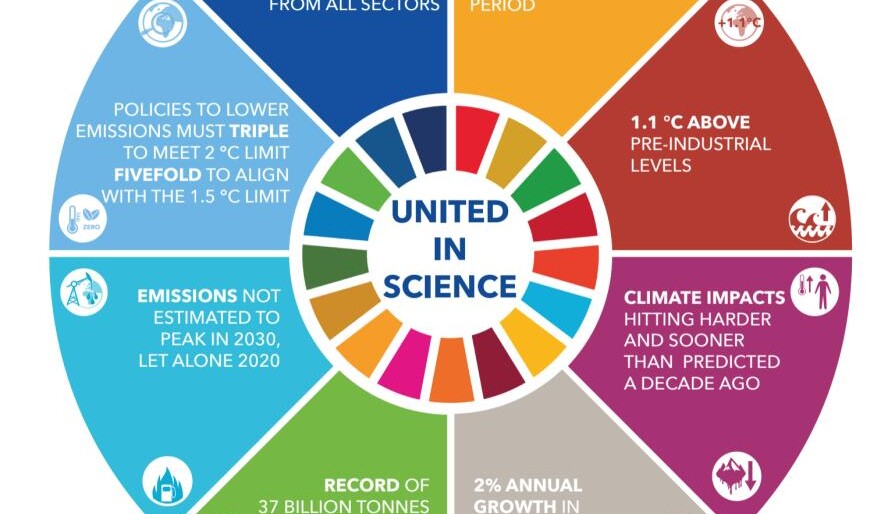See this excellent United Nations high level climate science synthesis (Sept 22 2019) of the latest from the advisory group to the UN Climate Action Summit. You can read the press release and summary here. This is provides the scientific foundation for much more bold action in California– accelerated timelines and more aggressive policies to address the climate crisis. -Ellie Cohen
Key Points:
- There is growing recognition that climate impacts are hitting harder and sooner than climate assessments indicated even a decade ago
- Meeting the Paris Agreement of staying below 2C warming requires immediate and deep decarbonisation, protection and enhancement of carbon sinks and biodiversity, and efforts to remove CO2 from the atmosphere
- Current country commitments to reduce emissions globally need to be 3x greater to be in line with the 2°C goal and 5x more for the 1.5°C goal. Technically it is still possible to bridge the gap
Foreword by António Guterres, United Nations Secretary-General:
Climate change is the defining challenge of our time. This important document by the United Nations and global partner organizations, prepared under the auspices of the Science Advisory Group of the Climate Action Summit, features the latest critical data and scientific findings on the climate crisis. It shows how our climate is already changing, and highlights the far-reaching and dangerous impacts that will unfold for generations to come. Science informs governments in their decision-making and commitments. I urge leaders to heed these facts, unite behind the science and take ambitious, urgent action to halt global heating and set a path towards a safer, more sustainable future for all.
Key Messages:

The Global Climate in 2015 – 2019
• Average global temperature for 2015-2019 is on track to be the warmest of any equivalent period on record. It is currently estimated to be 1.1°C above pre-industrial (1850-1900) times and 0.2°C warmer than 2011-2015
• Observations show that global mean sea level rise is accelerating and an overall increase of 26% in ocean acidity since the beginning of the industrial era
Global Fossil CO2 Emissions
• CO2 emissions from fossil fuel use continue to grow by over 1% annually and 2% in 2018 reaching a new high
• Growth of coal emissions resumed in 2017
• Despite extraordinary growth in renewable energy, fossil fuels still dominate the global energy system
Greenhouse Gas Concentrations
• Increases in CO2 concentrations continue to accelerate
• Current levels of CO2, CH4 and N2O represent 146%, 257% and 122% respectively of preindustrial levels (pre-1750)
Emissions Gap
• Global emissions are not estimated to peak by 2030, let alone by 2020
• Implementing current unconditional NDCs would lead to a global mean temperature rise between 2.9°C and 3.4°C by 2100 relative to pre-industrial levels, and continuing thereafter
• The current level of NDC ambition needs to be roughly tripled for emission reduction to be in line with the 2°C goal and increased fivefold for the 1.5°C goal. Technically it is still possible to bridge the gap
Intergovernmental Panel on Climate Change 2018 & 2019 Special Reports
• Limiting temperature to 1.5°C above pre-industrial levels would go hand-in-hand with reaching other world goals such as achieving sustainable development and eradicating poverty
• Climate change puts additional pressure on land and its ability to support and supply food, water, health and wellbeing. At the same time, agriculture, food production, and deforestation are major drivers of climate change
Climate Insights
• Growing climate impacts increase the risk of crossing critical tipping points
• There is a growing recognition that climate impacts are hitting harder and sooner than climate assessments indicated even a decade ago
• Meeting the Paris Agreement requires immediate and all-inclusive action encompassing deep decarbonisation complemented by ambitious policy measures, protection and enhancement of carbon sinks and biodiversity, and effort to remove CO2 from the atmosphere
Global Framework for Climate Services
• Climate and early warning information services should underpin decision-making on climate action for adaptation
• The capacities of countries to deliver climate and early warning information services varies across regions
—–
This report has been compiled by the World Meteorological Organization under the auspices of the Science Advisory Group of the UN Climate Action Summit 2019, to bring together the latest climate science related updates from a group of key global partner organizations – The World Meteorological Organization (WMO), UN Environment (UNEP), Intergovernmental Panel on Climate Change (IPCC), Global Carbon Project, Future Earth, Earth League and the Global Framework for Climate Services (GFCS). The content of each chapter of this report is attributable to published information from the respective organizations. Overall content compilation of this material has been carried out by the World Meteorological Organization. This report is available electronically, together with more extended background reports and additional supporting material at: public.wmo.int/en/resources/united_in_science


